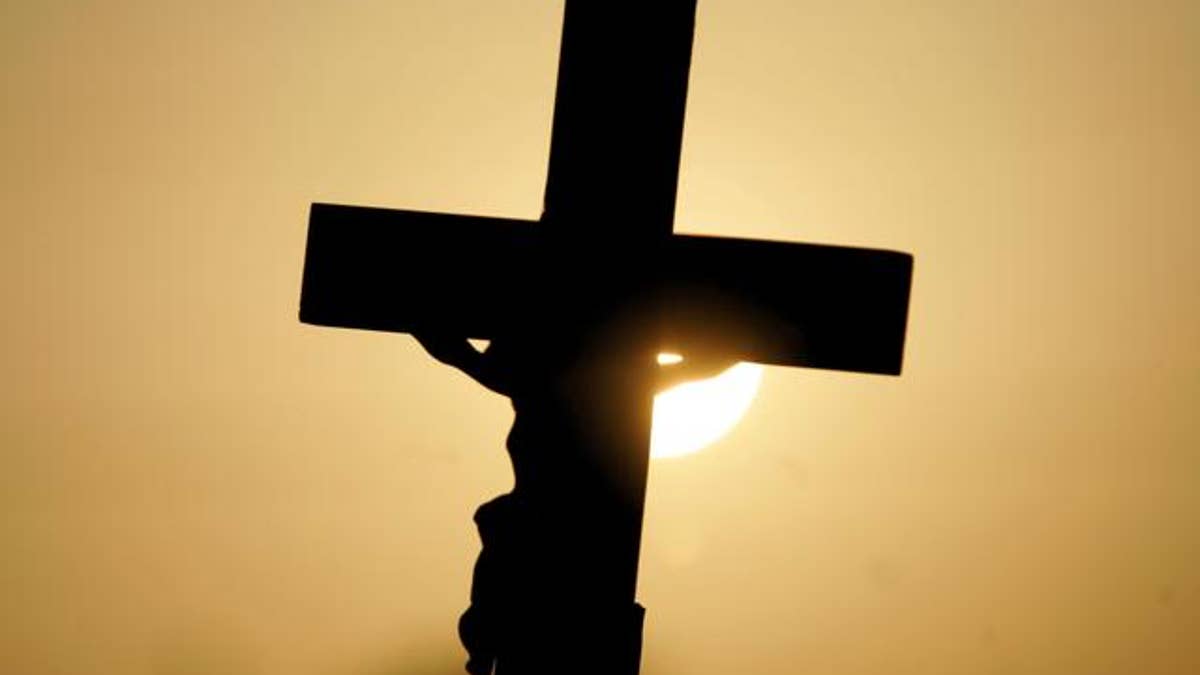
FILE -- A cross is silhouetted against the sun outside the Woodside Hospice in Pinellas Park, Fla. (AP)
Throughout the Middle East and North Africa today, Christianity is under attack. Terrorist organizations such as the Islamic State of Iraq and Syria (ISIS) are destroying some of the oldest and most sacred Christian communities and relics in the world on the very lands where Christianity was born and first took root. They are committing brutal atrocities against Christian communities in Syria and Iraq, persecuting religious minorities and destroying entire towns and local economies. Christians are fleeing their homes in increasing numbers, creating an exploding refugee crisis that will have grave ramifications on the stability and security of the entire region.
While the world has been rightly outraged by the violence waged by ISIS against people of all sects, ethnicities, and religions, the United States, Europe and other key allies have done little to end ISIS’s systematic efforts to drive-out and eradicate entire religious communities from their historic and sacred homelands. The Obama Administration has repeatedly refused to defend religious freedom abroad and continues to ignore its devastating cost to those religious communities targeted by terrorists because of their religious beliefs.
As a nation founded in the pursuit of religious freedom, America can and must do more to root-out the religious intolerance that is helping to foster much of the political instability and violence we see today. Specifically, we believe the Obama Administration should integrate the protection of religious freedom into its overall response to growing terrorist threats and development efforts around the world. Doing so would help to eliminate the underlying causes of violent extremism, promote increased international economic stability, and foster greater respect for human rights.
Promoting religious freedom would, first and foremost, undermine the efforts of terrorist organizations such as ISIS to capitalize on simmering religious intolerance to build influence and wield power. ISIS has succeeded in tearing apart the social fabric of local communities and exacerbating sectarian and ethnic divisions to recruit supporters from disaffected populations and assert control over wide swaths of otherwise insecure territory. As a result, they have precipitated a breakdown of basic order that has allowed new and unprecedented security threats to the United States and our allies to fester and grow.
As a nation founded in the pursuit of religious freedom, America can and must do more to root-out the religious intolerance that is helping to foster much of the political instability and violence we see today.
The Obama administration can counter this strategy by building alliances with popular local and regional leaders who can expose these radical ideologies’ moral bankruptcy and champion pluralism and tolerance. The Administration should also combat terrorist propaganda about religious minorities and develop programs that promote tolerance and empower minorities to better advocate for their rights and interests. Only by reaffirming the importance of religious freedom and working closely with communities and their governments will we be able to strip away sympathy and support for ISIS and other extremist groups that is bred from deeper political, economic, and social grievances.
Properly designed and implemented, a U.S. foreign policy committed to religious freedom can advance our national security interests, stabilize and consolidate the spread of democracy across the globe, help sustain economic growth, and promote the equality of men and women.
Most importantly, it can help prevent religiously-motivated terrorism and undermine the conditions that have helped spur the rise of groups like ISIS, Boko Haram, and the Shuddhikaran Movement.
Promoting religious freedom would also support the governance structures necessary for economic and political security in developing nations. As recent studies by groups such as the Religious Freedom and Business Foundation have found, higher levels of religious freedom are associated with higher levels of economic productivity and growth. Clearly, sustainable political and economic development is only possible when religious freedom and equal opportunity contributes to a secure environment in which citizens and businesses can operate freely.
Finally, we must remain committed to religious freedom because of the special distinction religious freedom holds as a fundamental human right—a belief that is shared by democratic countries across the globe and protected by numerous international treaties and agreements.
American support for religious liberty sends a potent and unmistakable message to threatened communities around the world: America is your friend. Such support builds enduring good will towards our country among those who could be leading their own nations in the years ahead. And it reminds all observers, whether friendly or hostile, that the U.S. remains committed to a world where justice and human dignity are central to legitimate governance.
